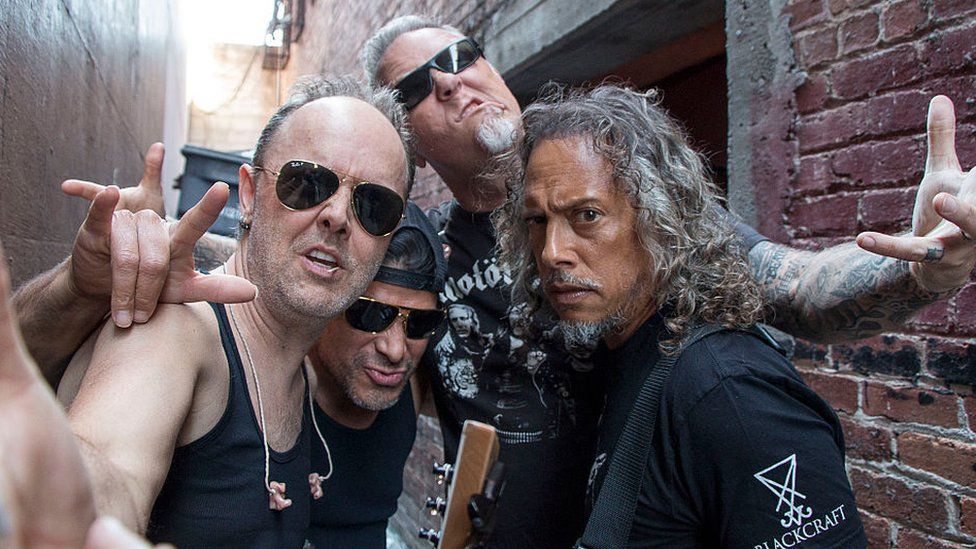ARTICLE AD BOX
 Image source, Getty Images
Image source, Getty Images
Metallica (L-R): Lars Ulrich, Robert Trujillo, James Hetfield and Kirk Hammett,
By Mark Savage
BBC Music Correspondent
On the credits for Metallica's third album, Master Of Puppets, the band gleefully thank three of their biggest inspirations: Carlsberg lager, Absolut vodka and Alka-Seltzer.
In those days, their philosophy was "take on the world and drink all of its booze"; and they left a trail of destruction everywhere they played.
"We used to start drinking when we woke up. We'd get the gig over by three o'clock, and then we'd have eight or nine hours to drink," said drummer Lars Ulrich in 2003, recalling the infamous Monsters Of Rock tour they undertook with Van Halen in 1988.
"There are pictures of us at the top of Tampa Stadium with our pants off, flashing everybody. It's four o'clock in the afternoon and we're already drunk off our asses."
"It was bad coming back to some of those towns later, because there were a lot of dads and moms and husbands and boyfriends looking for me," said frontman James Hetfield. Except he didn't know why: "That whole tour was a fog."
At the time, the band were still shell-shocked by the loss of their bassist Cliff Burton in a 1986 coach accident. Although they soldiered on, their grief was buried in substance abuse and dysfunctional relationships.
In, 2004, Hetfield eventually entered rehab to address his addictions. The rest of Metallica are similarly reformed characters.
"The days of going off your rocker all night and watching the sun rise are somewhat behind us," says Ulrich, over the phone from America.
For his part, the drummer has swapped lager and vodka for a more genteel addiction: tea.
"There's a teapot and a cup right in front of me, within arm's reach," he laughs.
"I pretty much live on Earl Grey tea, with a little hint of vanilla in this particular blend. Not only is it yummy but it keeps me fired up. I drive everybody around me nuts with my crazy energy."
But then, Ulrich has always been Metallica's beating heart.
Image source, Tim Saccenti
Image caption,The band have chosen a yellow and black palette - the colour of crime scene tape - for their new album
He was the one who placed a newspaper advert in 1981, reading: "Drummer looking for other metal musicians to jam with." He was the one who convinced a friend to surrender the name Metallica, and give it to the group. And he remains the quartet's unofficial historian, spokesperson and musical director.
When it came to creating Metallica's 11th album, 72 Seasons, Ulrich did what he always does: cued up a conveyor belt of steaming hot tea, and began to sift through months of material.
"It's one of the only things that hasn't changed in 40 years," he says. "There'll be a whole slew of riffs and jams and sound checks, then it falls into my lap to go through them and identify, 'That one's great, that one's good, maybe there's a song over here'."
The result is one of Metallica's hardest, most pulverising records to date - a continuous onslaught of riffs that falls on you like a landslide.
"For a bunch of dudes who've been around the block, I like the fact that it's pretty relentless," he says.
From the outset, Hetfield guns the accelerator. The title track is full of razor-edged thrash guitars, breakneck rhythms and vivid lyrics about the "wrath of man". That segues into the claustrophobic night terrors of Shadows Follow; while Screaming Suicide is a more straightforward metal workout that still registers at the top of the Scoville scale.
But underneath the squall and the thunder, the album finds Hetfield at his most vulnerable.
The singer has had his share of upheavals lately, from a second stint in rehab to his divorce from costume designer Francesca Tomasi, and he pours that pain into the record, with revealing lyrics about temptation, isolation, "bloodshot eyes" and the "phantom" of fame.
Perhaps the most powerful is Screaming Suicide, a dark dialogue between Hetfield and his inner demons, in which he resists the lure of self-destruction.
"It's ridiculous to think we should deny that we have these thoughts," the singer said in a statement addressing the lyrics. "It's a human experience, we should be able to talk about it."
"One thing that James is really good at is reiterating that you're not alone," adds Ulrich.
"All of us deal with darker issues at different levels of intensity - and often getting it out of your system and into a conversation can really help."
The band's self-titled 1991 album, also known as The Black Album, is the 18th biggest-selling record of all time
The song encapsulates the concept of 72 Seasons: that the emotions and experiences of your first 18 years stay with you for the rest of your life.
For Ulrich, who was raised an only child in bohemian Denmark, that means feeling like a "loner" and a "misfit", despite selling 125 million records worldwide.
"That's not how it works. Yes, there are definitely times where it dissipates and you feel the euphoria of the music connecting to an incredible group of 80,000 people. But I still go through periods where there's an underlying current of 'you're an outsider, you're a little bit of a misfit'."
After running from those feelings for over an hour, the closing track of 72 Seasons finally lets in a ray of light, as Hetfield decides: "My misery / She's not what I'm living for."
At more than 11 minutes, Inamorata is the longest song they've ever recorded, a constantly-shifting requiem built from a "jam session in the tuning room" of their last tour, and developed extensively over lockdown.
But with Hetfield and Ulrich both turning 60 this year, playing songs of such length and complexity is an increasingly daunting task.
"I get my ass to the gym and stay there longer than I have in the past," admits the drummer. "And the interesting thing, as you get older, is that you have to put more effort in just to stay at the same level or even keep the plateau horizontal."
A keen outdoor runner, he switched to a treadmill during lockdown; and now spends hours on a Peloton, using the time to watch Tarantino boxsets and fall down YouTube wormholes.
As he gets in shape for tour rehearsals, that's meant digging out obscure live clips of Black Sabbath and Deep Purple.
"You get not only inspired, but every time you discover something you'd missed. It's one thing being turned on to something new - but going back and finding something new in music that you've had relationships with for 40 years is equally satisfying."
We detour into a long discussion of Deep Purple's 1972 live album Made In Japan, which is one of Ulrich's all-time favourites.
Originally captured in Osaka and Tokyo, the official release is compiled from multiple tour dates - but recordings exist of each separate show, and the musician is fascinated by how the set evolved.
"Most bands in 2023, including the one you're talking to here, the songs don't vary much from night to night," he says. "But if you take a song like Child In Time and listen to the recording on Made In Japan and then listen to the alternate takes from the night before and the night after, it's insane how different they all are.
"One night the song is eight minutes long and the other night it's 11, and it's all improvised. The musicians are just jumping out there and seeing where it takes them."
Image source, Getty Images
Image caption,Deep Purple were a huge influence on Ulrich as a child
For Metallica, that's not always possible.
"It's a great when music leaves your head and inhabits your body, but there are some Metallica songs where you need to keep thinking.
"Like Blackened, for instance, you have to really stay on top of all the the starts and stops and tempo changes. 'Here it comes. Four bars away, I hope I don't screw this up!'"
To keep things fresh, the band are taking a new approach on their upcoming tour. Dubbed the "no-repeat weekend", it'll see the band pull into a new town every week (including Leicestershire's Download Festival) and play two shows, with a completely different setlist and support line-up each night.
"It's a little crazy, a little daunting," says Ulrich, "but it gives you a completely blank canvas every night, which is always a good thing when you've been around as long as we have."
Image source, Getty Images
Image caption,Metallica's M72 tour kicks off in Amsterdam later this month
Metallica's other innovation in 2023 is to buy their own vinyl factory in Virginia.
Principally, it allows them to meet demand. Metallica were the sixth biggest-selling artist on vinyl in the US last year, selling 387,000 records from their back catalogue.
But the move is also borne of necessity. In order to have enough vinyl ready for the release of 72 Seasons, Metallica had to submit the album six months in advance. All that time, they were faced with the possibility of the music leaking. By purchasing Furnace Records, which has pressed their discs for the last 15 years, they can reduce those lead times.
Ulrich says they won't be the only beneficiaries, however.
"It's a little daunting, but we're trying to figure out a way to integrate what we're doing with helping our brothers and sisters in other bands, and making sure the presses keep running towards maximum capacity. Hopefully that way, we can help get more independent music out to people."
And presumably, he can print some crazy, one-off Deep Purple bootlegs just for himself?
"You know what?" he laughs conspiratorially. "I'll just sneak in there at three o'clock in the morning and get some next-level Made in Japan live variations on vinyl. Just the two copies, one for you and one for me."

 2 years ago
42
2 years ago
42








 English (US) ·
English (US) ·